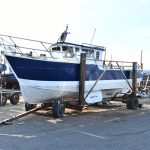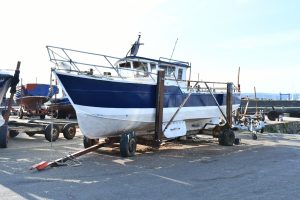Salvage boats can be a great option for boat enthusiasts looking for a good deal. In this article, we will explore why salvage boats are worth considering, the benefits of buying salvage boats, and important factors to consider when purchasing one. We will also provide tips on finding the best deals on salvage boats, including researching salvage boat auctions, inspecting the boats, negotiating the price, and working with salvage boat dealers.
Understanding Salvage Boats
What are Salvage Boats?
Salvage boats are damaged vessels sold at a lower price. They offer cost savings, customization options, and unique histories. Safety inspections are important when buying salvage boats, and they can be acquired through insurance companies, salvage yards, and online auctions. Buying a salvage boat can be a rewarding project. It gives us the chance to restore and bring new life to a boat that may have been neglected or damaged. It’s a fulfilling endeavor that allows us to showcase our skills and creativity.
How do Salvage Boats End up in Auctions?
Salvage boats end up in auctions through a variety of channels. Some boats are declared a total loss by insurance companies after being involved in accidents, storms, or other incidents that cause significant damage. These boats are then sold at salvage boat auctions to recoup some of the insurance company’s losses. Other salvage boats may be repossessed by banks or financial institutions due to non-payment or default on loans. These boats are also auctioned off to recover the outstanding debt. Additionally, individuals may choose to sell their salvage boats directly to salvage boat dealers or consign them to auction houses. This allows them to quickly sell their damaged boats and potentially recoup some of their investment. Overall, salvage boats end up in auctions as a result of various circumstances, providing buyers with a wide range of options to choose from.
Benefits of Buying Salvage Boats
When it comes to buying salvage boats, there are several benefits to consider. First and foremost, cost savings is a major advantage. Salvage boats often come at a much lower price compared to new or used boats in good condition. This means that you can get a high-quality boat for a fraction of the cost. Additionally, buying a salvage boat allows you to customize and personalize it according to your preferences. You have the freedom to make modifications and upgrades without worrying about damaging the boat’s original value. Another benefit is the opportunity to own a unique boat. Salvage boats often have interesting histories and stories behind them, which adds character and charm to your boating experience. Lastly, buying a salvage boat can be a rewarding project. It gives you the chance to restore and bring new life to a boat that may have been neglected or damaged. It’s a fulfilling endeavor that allows you to showcase your skills and creativity.
Types of Wrecked Boats
Damaged Powerboats
When considering damaged powerboats at salvage boat auctions, there are several important factors to keep in mind. Mechanical and cosmetic damage, resale value, replacement parts availability, and cost-benefit analysis should all be taken into consideration. Thorough inspection, survey, and estimation of repair costs are crucial in making an informed decision. Here are some key steps to follow when assessing the condition and potential for repairs:
- Examine the Hull: Check for any signs of damage or structural issues, such as cracks, dents, or signs of previous repairs.
- Inspect the Engine: Start the engine and listen for any unusual noises. Check the oil and coolant levels, as well as the condition of the belts and hoses.
- Check the Electrical System: Test all the electrical components, including lights, navigation systems, and radios.
- Evaluate the Interior: Look for any water damage, mold, or signs of deterioration. Check the condition of the upholstery, flooring, and cabinetry.
- Assess the Safety Equipment: Ensure that the salvage boat has all the necessary safety equipment, such as life jackets, fire extinguishers, and flares.
- Consider the Cost of Repairs: Estimate the cost of repairs needed to make the salvage boat seaworthy. This will help you determine if it is a worthwhile investment.
Remember, it is always recommended to hire a professional marine surveyor to inspect the salvage boat before making a purchase.
Sailboats in Need of Repair
When it comes to sailboats in need of repair, there are a few important factors to consider before making a bid. First, carefully assess the extent of damage to the sailboat. Look for any structural issues, such as cracks or dents in the hull, as well as any damage to the rigging or sails. It’s also important to evaluate the condition of the interior, including the upholstery, flooring, and cabinetry. Look for any signs of water damage, mold, or deterioration.
Next, determine the estimated repair costs for the sailboat. This will help you decide if the investment is worthwhile. Consider the cost of materials, labor, and any specialized expertise that may be required for the repairs.
Lastly, don’t forget to evaluate the sailboat’s history. Look for any previous incidents or accidents that may have contributed to its current condition. This information can give you a better understanding of the sailboat’s overall value and potential for restoration.
Remember, when bidding on sailboats in need of repair, it’s important to approach the process with caution and thorough research. Take the time to gather as much information as possible about the sailboat’s condition, history, and market value. This will help you make an informed decision and potentially secure a great deal on a salvage boat.
If you’re interested in exploring salvage boats for sale, including sailboats in need of repair, consider participating in online salvage boat auctions. These auctions provide a convenient platform to find a wide range of wrecked boats at competitive prices. Whether you’re an experienced boat restorer or a first-time buyer, there are opportunities to find the perfect salvage boat for your needs. Start bidding today and embark on your salvage boat restoration journey!
Recovering from Storm-Damaged Boats
Recovering from storm-damaged boats can be a challenging and rewarding process. Boat restoration companies specialize in repairing structural and cosmetic damages, replacing damaged parts, and transforming wrecked boats into stunning masterpieces. The process involves meticulous planning, attention to detail, and expertise to ensure safety, durability, and aesthetics. When restoring a storm-damaged boat, there are several factors to consider:
- Assessing the extent of damage: It’s important to thoroughly inspect the boat to determine the scope of repairs needed.
- Determining repair costs: Understanding the cost of repairs can help you make an informed decision about whether the boat is worth restoring.
- Evaluating the boat’s history: Knowing the boat’s history, including previous repairs and maintenance, can provide valuable insights into its condition.
Restoring a storm-damaged boat requires skilled professionals who have experience in dealing with these types of repairs. By working with experts in boat restoration, you can bring a storm-damaged boat back to life and enjoy the thrill of sailing once again.
Factors to Consider Before Bidding
Assessing the Extent of Damage
When assessing the extent of damage on a salvage boat, it is important to thoroughly examine various aspects of the vessel. Here are some key steps to follow:
- Examine the Hull: Check for any signs of damage or structural issues. Look for cracks, dents, or signs of previous repairs.
- Inspect the Engine: Start the engine and listen for any unusual noises. Check the oil and coolant levels, as well as the condition of the belts and hoses.
- Check the Electrical System: Test all the electrical components, including lights, navigation systems, and radios.
- Evaluate the Interior: Look for any water damage, mold, or signs of deterioration. Check the condition of the upholstery, flooring, and cabinetry.
- Assess the Safety Equipment: Ensure that the salvage boat has all the necessary safety equipment, such as life jackets, fire extinguishers, and flares.
- Consider the Cost of Repairs: Estimate the cost of repairs needed to make the salvage boat seaworthy. This will help you determine if it is a worthwhile investment.
By thoroughly assessing the extent of damage, you can make an informed decision when bidding on salvage boats. Remember, Salvage Boats Auction offers a wide range of wrecked boats, including sailboats, powerboats, and storm-damaged boats. Visit our website to explore the available options and find the perfect salvage boat for your needs.
Determining Repair Costs
When it comes to determining repair costs for a salvage boat, there are several factors to consider. Assessing the extent of repairs, considering hidden costs, setting a realistic budget, researching similar models and market prices, and checking for water damage and corrosion are important steps in making informed bidding decisions for repairable boats at online auctions. It’s crucial to thoroughly evaluate the condition of the boat and estimate the cost of repairs before placing a bid.
One effective way to determine repair costs is by creating a detailed itemized list of necessary repairs and their associated expenses. This will help you get a clear understanding of the total cost involved in restoring the boat. Additionally, researching the average prices for repair services in your area can give you a better idea of what to expect in terms of costs.
It’s also important to keep in mind that repair costs can vary depending on the type and extent of damage. Some repairs may be relatively minor and affordable, while others may require extensive work and a larger budget. By carefully considering the repair costs, you can make a well-informed decision and avoid any unexpected financial burdens.
Tips for determining repair costs:
- Assess the extent of repairs
- Consider hidden costs
- Set a realistic budget
- Research similar models and market prices
- Check for water damage and corrosion
Remember, determining repair costs is an essential step in the salvage boat auction process. By thoroughly evaluating the condition of the boat and estimating the cost of repairs, you can make a confident bidding decision and ensure a successful restoration project.
Evaluating the Boat’s History
When evaluating the history of a salvage boat, it is essential to gather as much information as possible about its past. This includes details about previous owners, any accidents or incidents the boat may have been involved in, and any repairs or modifications that have been made. Researching the boat’s history can provide valuable insights into its overall condition and potential issues that may need to be addressed. Additionally, it is important to consider the boat’s usage history, such as whether it was primarily used for recreational purposes or for commercial activities. This information can help determine the level of wear and tear the boat may have experienced.
To assist in evaluating the boat’s history, consider creating a table that outlines key information such as:
- Previous owners
- Accident or incident history
- Repair and modification records
- Usage history
By organizing this information in a structured manner, you can easily reference and analyze the boat’s history during the decision-making process.
Tip: When researching the boat’s history, it can be helpful to reach out to previous owners or consult with professionals who specialize in boat history research. They may have additional insights or documentation that can provide a more comprehensive understanding of the boat’s past.
Navigating the Salvage Boat Auction Process
Finding Reliable Auction Platforms
When it comes to finding reliable auction platforms for salvage boats, we understand the importance of trust and transparency. At Salvage Boats Auction, we have built a reputation for providing a seamless and secure online auction experience. Our platform offers a wide selection of wrecked boats, including powerboats, sailboats, and storm-damaged boats, all available for bidding. With our user-friendly interface, you can easily navigate through the listings, view detailed information about each boat, and place your bids with confidence. We also provide comprehensive auction terms and conditions, ensuring that you have all the necessary information before making a decision. Join us today and discover the thrill of finding your perfect salvage boat at an affordable price.
Understanding Auction Terms and Conditions
When participating in a salvage boat auction, it is crucial to understand the terms and conditions set by the auction platform. These terms outline the rules and guidelines that govern the bidding process and the subsequent purchase of the boat.
To ensure a smooth and successful auction experience, here are some key points to keep in mind:
- Read the terms and conditions thoroughly before placing any bids. This will help you understand the responsibilities and obligations that come with winning the auction.
- Pay attention to important details such as payment methods, delivery options, and any additional fees that may apply.
- Take note of any specific requirements for registering as a bidder, such as providing identification or proof of funds.
Remember, familiarizing yourself with the auction terms and conditions will not only protect your interests but also increase your chances of securing the wrecked boat of your dreams. Happy bidding!
Bidding Strategies for Success
When it comes to bidding on salvage boats at auction, there are a few strategies that can help increase your chances of success. First and foremost, do your homework. Before attending an auction, research the boats that will be available for bidding. Take note of their condition, history, and estimated value. This will help you make informed decisions and avoid any surprises.
Next, set a budget. It’s important to determine the maximum amount you are willing to spend and stick to it. This will prevent you from overspending and ensure that you get the best deal possible.
Another strategy is to attend multiple auctions. Don’t limit yourself to just one auction. By attending multiple salvage boat auctions, you increase your chances of finding the perfect boat at the right price. Each auction may have different boats available, so it’s worth exploring different options.
Lastly, develop bidding strategies. Understand auction terms and conditions, and secure the winning bid to acquire salvage boats at a great price. Research and explore financing options for salvage boat auctions. These strategies will help you navigate the auction process and increase your chances of success.
Restoring and Reselling Salvage Boats

Choosing the Right Repair Approach
When it comes to choosing the right repair approach for your salvage boat, we understand that it can be a daunting task. However, it is crucial to carefully consider your options to ensure the best outcome. Here are a few factors to keep in mind:
- Extent of Damage: Assess the extent of damage to determine the scope of repairs needed.
- Repair Costs: Evaluate the potential repair costs and compare them to the value of the boat.
- Boat’s History: Research the boat’s history to uncover any previous issues or damages.
By taking these factors into account, you can make an informed decision on the most suitable repair approach for your salvage boat.
Working with Experienced Boat Restorers
When it comes to restoring salvage boats, working with experienced boat restorers is essential. These professionals have the knowledge and expertise to bring a damaged boat back to life. They understand the intricacies of boat construction and can identify the areas that need repair or replacement. By entrusting your salvage boat to an experienced restorer, you can have peace of mind knowing that it is in capable hands.
Experienced boat restorers also have access to a wide range of resources and suppliers. They know where to find quality replacement parts and materials, ensuring that your boat is restored to its original condition. They can also provide valuable advice on the best repair approach for your specific boat.
In addition, working with experienced boat restorers can save you time and money. They have the skills to efficiently complete the restoration process, minimizing the downtime of your boat. They can also help you avoid costly mistakes that could arise from DIY repairs.
Here are some tips for finding and working with experienced boat restorers:
- Research and ask for recommendations from fellow boaters or boat clubs.
- Check the restorer’s portfolio and ask for references.
- Discuss your restoration goals and budget with the restorer.
- Clearly communicate your expectations and timeline.
- Regularly communicate with the restorer to stay updated on the progress of the restoration.
Remember, restoring a salvage boat is a collaborative process. By working closely with experienced boat restorers, you can transform a wrecked boat into a beautiful vessel ready for the water.
Marketing and Selling Salvage Boats
When it comes to marketing and selling salvage boats, we understand the importance of maximizing profit and finding the right buyers. Here are some key strategies to consider:
- Highlight the Unique Features: Emphasize the distinctive qualities of the salvage boat, such as its history, design, or any special modifications. This can attract buyers who are looking for something unique and different.
- Provide Detailed Information: Be transparent about the boat’s condition, repairs needed, and any potential issues. This helps build trust with potential buyers and ensures they have all the information they need to make an informed decision.
- Utilize Online Platforms: Take advantage of online platforms and marketplaces that specialize in salvage boats. These platforms have a wide reach and can connect you with potential buyers from all over.
- Engage with the Boating Community: Participate in boating forums, social media groups, and events to connect with boating enthusiasts. Building relationships within the community can lead to potential buyers or referrals.
- Offer Competitive Pricing: Research the market and set a competitive price for your salvage boat. Consider factors such as the boat’s condition, repair costs, and market demand. Offering a fair price can attract more buyers and increase your chances of a successful sale.
Remember, marketing and selling salvage boats requires a strategic approach. By implementing these strategies and leveraging the right platforms, you can maximize your profit and find the right buyers for your salvage boat.
Restoring and reselling salvage boats can be a rewarding and profitable venture. At SalvageBoatsAuction.com, we bring you hundreds of boats from a facility near you to have at your disposal. Whether you’re a boat enthusiast looking for a new project or a business owner searching for inventory, we have the right repairable salvage boat for you. With over 150,000 salvaged vehicles for sale, we offer a wide range of makes and models to choose from. Visit our website today and find the perfect salvage boat near you!











